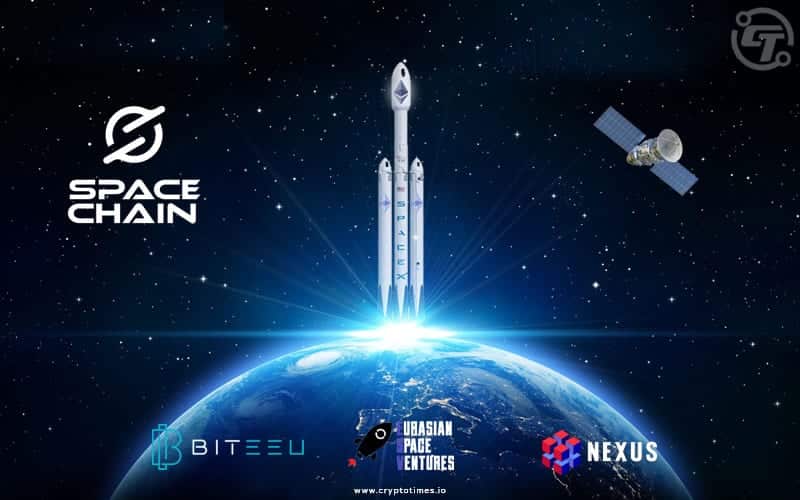SpaceChain deploying Ethereum (ETH) node to the International Space Station (ISS) on 3rd June, marking the first time an ETH nodes launch into space. SpaceChain, a decentralized infrastructure provider hired SpaceX to deliver cargo to the ISS.
SpaceX would use its Falcon 9 rocket to deliver the first Ethereum node to the International Space Station. The launch of the ETH node aboard the ISS will be the company’s fourth blockchain payload to enter orbit.
The firm announced two missions aboard SpaceX Falcon 9 rockets that they expect to complete in June. This mission is possible due to a relationship with space solutions firm Nanoracks. They will see SpaceChain’s “space node” launched and ultimately installed at the International Space Station (ISS). That will act as the first demonstration of Ethereum technology on SpaceChain’s existing hardware aboard the ISS.
The firm said having an Ethereum node in space brings physical security when transacting in crypto assets.
In their blog, the firm said: “The security of space infrastructures also ensures the independence of Ethereum contract operation from centralized terrestrial servers, thus providing more efficient smart contract operation and greater application scenarios.”
One of their clients, digital asset manager Nexus Inc. is planning to develop additional blockchain capabilities for enterprise business applications.
Customers of Nexus will also have the ability to perform highly secure on-orbit Ethereum multi-signature transaction services. Since they can directly uplink and downlink all the data through a dedicated space encrypted communication network.
Zee Zheng, SpaceChain co-founder, and CEO said, “The launch missions are paving the way for the commercialization of space-based innovations as we see more enterprises share the same vision in leveraging the new space economy for heightened security and immutability”.
Second launch on June 24, Bitcoin node
SpaceChain is expecting to launch the second payload on June 24, again using the Falcon9 rocket of SpaceX. This payload will help in the installation of Bitcoin nodes created for cryptocurrency exchange Biteeu and Nexus Inc. on a YAM-2 satellite.
For this launch, Nexus Inc. will implement SpaceChain’s Bitcoin hardware wallet technology into its system. This will enable their customers to use ultra-secure multi-signature transactions. With this, the Nexus Inc. platform will be able to utilize both Bitcoin and Ethereum blockchains for its portfolio of services such as asset custody, a suite of e-commerce products, and data security.
Biteeu will leverage the high security of space-grade infrastructure deployed by SpaceChain for ultra-secure Bitcoin cryptocurrency transactions and data back-up, the first of its kind in the industry. The Biteeu space node will have the capacity to process Bitcoin transactions across multiple blockchains and perform multi-signature transactions.
Also Read: SpaceX Accepts Dogecoin As Payment To Launch Doge-1 Lunar Mission
Driven by the remoteness of the node and end-to-end encrypted satellite communication, Biteeu is set to enhance the security of its customers’ data.
The space node will also enhance transactions by multiple folds compared to other digital currency exchanges with land-based servers.
A third part of the payload for this mission will be a node for Divine, a community project leveraging space technology to broadcast the teachings of the Quran around the globe. Eurasian Space Ventures (ESV) will manage and operate the nodes for Biteeu and Divine.
With this launch, SpaceChain has brought New Commercial Use Cases for the Blockchain Industry in Outer Space.







